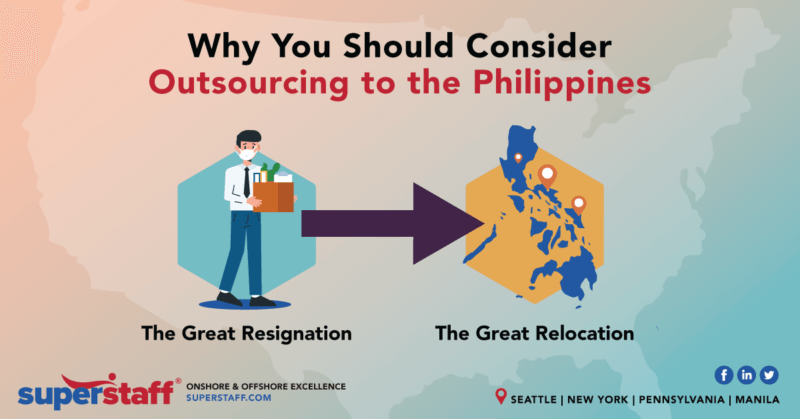
Faced with enormous labor and economic challenges, U.S. businesses flee to areas that offer lower costs, may it be for office rentals or wages. If you are considering joining the “The Great Relocation” wave, take a moment to read this article to discover a more pragmatic solution: outsourcing to the Philippines.
First, There Was ‘The Great Resignation’
For more than a year now, headlines about thousands of employees quitting their jobs have dominated news feeds. The latest data from the Bureau of Labor and Statistics show that quit rates have hit a record-high of 3% in September and November of 2021.
Unfortunately, the movement that has sent employers into an all-out war for talents has shown no end in sight. High employee turnover continues to set off a chain of phenomena that drive employers’ restlessness.
Indeed, as “The Great Resignation” persists, another trend is happening on the sidelines: “The Great Relocation.”
Then Came ‘The Great Relocation’
Companies are on the move. After more than two years of facing unprecedented significant disruptions, business leaders have become increasingly open to exploring new ideas, including new office locations in other states.
According to a survey of 383 CEOs, 44% of business leaders are now more open to examining new locations than before the pandemic. About 34% are also considering moving or establishing significant operations in a new state. This unusual trend in modern American history is dubbed “The Great Relocation.”
How ‘The Great Resignation’ Is Promoting Relocation
Companies looking to build larger talent pipelines flock to states with greater talent availability. No wonder Florida retained the second spot on Chief Executive’s list of Best States for Business in 2021. With more than 10 million workers, the Sunshine State is home to the third-largest workforce in the U.S.
Another reason U.S. companies are changing business addresses is talent attraction, which leads us to our next point.
Employees Are Relocating, Too
Employers are not the only ones changing zip codes. Freelancing platform, Upwork, foresees that up to 23 million American workers may relocate and drive a record-high internal migration rate since the 1950s.
As the rise of remote work frees employees from the shackles of the daily commute, many find themselves moving to areas with warmer climates and lower costs of living. A survey by The Harris Poll reveals that 41% of employed Americans are willing to take less pay to move to a more affordable location.
After All, They Have Attractive Options
High employee turnover and quit rate pushed the talent war to a macro level. Companies are no longer just the ones outdoing each other in providing attractive employee benefits. To boost their respective local economies, several states have started their competition.
For instance, Oklahoma is ready to pay employees $10,000 to move and work remotely in the state. West Virginia goes up a notch, offering $12,000 plus free outdoor gear rental for two years. On the other hand, Maine provides a tax credit program that assists graduates in paying off student loans.
Still, topping the list of most sought-after destinations are old-time favorites, Texas and Florida. Aside from low taxes and other cost advantages, these two southern states offer perks that larger cities cannot match: sunshine, open beaches, a less dense population, and lower crime rates.
Read more: Job Seekers’ Wishlist 2022: Top 7 Hiring Practices to Implement Amid ‘The Great Resignation’
The Problem With Relocation for Businesses
According to Chief Executive, business leaders value the following criteria the most when considering site locations:
- Tax Policy (37%)
- Regulatory Climate (35%)
- Talent Availability (25%)
However, only a few states meet these standards. In fact, only Texas and Florida scored high in the said areas, outclassing other states by significant margins.
Relocation also takes a considerable amount of time and causes operational downtimes. These disruptions may lead to lost productivity and even customer churn, as support may be unavailable to clients during the moving process.
Why Outsourcing to the Philippines Is the More Pragmatic Solution to Soaring Prices and High Employee Turnover and Quit Rates

#1: Businesses That Outsource to the Philippines Enjoy Tax Incentives
Foreign and local investors in the Philippines are provided with fiscal incentives. For instance, outsourcing companies that establish operations in particular economic areas and register with the Philippine Economic Zone Agency enjoy total corporate income tax exemption up to 6 years. Even those who implement work-from-home arrangements due to the pandemic take advantage of the tax holiday.
Other fiscal benefits that businesses can obtain by outsourcing to the Philippines are as follows:
- Up to 3 years tax- and duty-free equipment importation
- Up to 3 years wharfage dues exemption for equipment importation
- 0% vat on local purchases of goods and services for up to 3 years
- Local tax, license, impost, and fee exceptions
- A special tax rate after the tax holiday
Having access to these incentives enables outsourcing companies in the Philippines to pass on significant savings to U.S. businesses that acquire their outsourcing services.
#2: Companies That Outsource to the Philippines Enjoy Investor-Friendly Regulatory Climate
Aside from monetary incentives, the Philippine government extends a range of non-fiscal benefits to the outsourcing sector. These include:
- Seamless import-export procedures
- Permission to employ non-resident foreign nationals to PEZA-registered Economic Zone Enterprises (applicable to specific roles)
- Extension of visa facilitation assistance to spouses and dependents of foreign nationals employed in PEZA-registered Economic Zone Enterprises
The national government also enforces various laws and regulations that pave the way for the continued growth of the Philippine outsourcing industry. These include:
Telecommuting Act
This law allows outsourcing companies in the Philippines to continue to deliver services to their U.S. clients amid the pandemic. Granting telecommuting privileges to BPO employees helps protect outsourcing clients from disruptions.
Additionally, the Telecommuting Act helps entice top professionals to join the outsourcing sector. Therefore, businesses that outsource to the Philippines are granted access to a broader pool of high-caliber and digitally oriented talents.
Department of Information and Communications Technology (DICT) Act
This law paved the way for creating the country’s ICT development bureau. The department aims to strengthen the Philippines’ digital transformation efforts to deliver sustainable growth in the IT-BPM sector and the entire country’s economy.
One of the significant benefits of this law is data privacy and cybersecurity enhancements. The DICT’s wide-scale innovation initiatives also enable the country’s outsourcing sector to enhance competitiveness in providing higher-value services, such as data analytics, web development, information technology, and programming.
#3: By Outsourcing to the Philippines, U.S. Businesses Are Afforded Greater Talent Availability
While there is a scarcity of talents in the U.S., the opposite is happening in the Philippines. The COVID-19 pandemic has significantly reduced employment opportunities in the country. According to the nation’s statistics authority, the Philippines’ unemployment rate soared to 10.2% in 2020.
Still, the country’s business process outsourcing manages to grow and generate jobs. While other industries were downsizing, the Philippine outsourcing sector added 23,000 new hires in 2020. The positive trend is expected to continue in 2022, with projected headcount growth of 160,000.
The Philippine government also continues to invest in the upskilling of its workforce. Filipinos are given opportunities to be equipped with future-ready skills. The national government mandates free access to technical-vocational education. In addition, the country also offers free contact center training courses to individuals interested in joining the BPO sector.
Read more: 10 Reasons Why US Companies Outsource Customer Service to the Philippines
Thinking of Relocating? Consider Outsourcing With SuperStaff
By outsourcing to the Philippines, you can enjoy all the benefits you are looking for in relocating—but with less impact on your productivity and bottom line. SuperStaff is glad to help make this possible. Schedule a consultation with us to discuss the benefits of our outsourcing services today.





